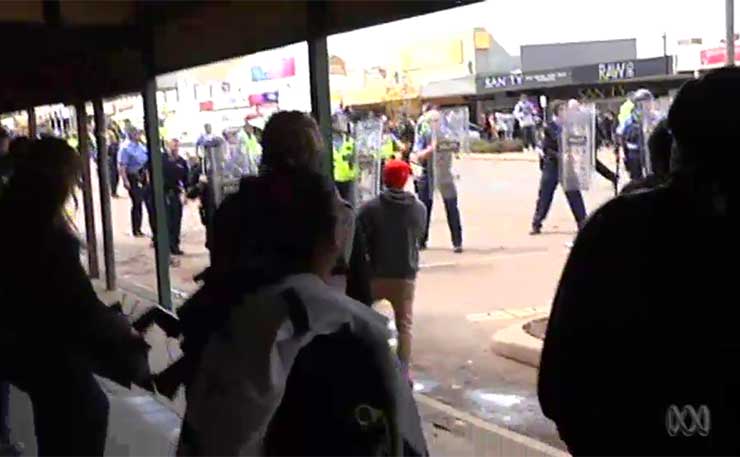Why do Australians turn away when another justice fails Aboriginal people? Dr Lissa Johnson explains the psychology behind the great Australian silence.
On Thursday evening a house rented by the man accused of killing Aboriginal teenager Elijah Doughty was set on fire.
The fire came almost three weeks after Elijah’s body was found near Gribble Creek in Kalgoorlie-Boulder, on August 29th. Elijah had allegedly been killed by a non-Aboriginal man who hit him with a ute. The man was subsequently charged with manslaughter.
A protest erupted outside the court house at the man’s hearing the next day. Stones and bottles were thrown. News media took some interest, calling it a ‘race riot’. Elijah’s family called for calm.
Elijah’s death, the courthouse protest and Thursday’s fire all occurred against a backdrop of white vigilantism in Kalgoorlie according to residents, and Facebook groups posting vicious threats of violence against Aboriginal people.
The day after the courthouse protest, New Matilda editor Chris Graham traced a litany of historical travesties behind protesters’ anger, White Man’s Manslaughter. Black Man’s Murder, a trail of Aboriginal victims whose white killers got off lightly, with lenient punishments or no punishment at all.
In a discussion of the topic on ABC radio, Associate Professor Gracelyn Smallwood from James Cook University, a highly awarded advocate, researcher, health professional and woman of Biri descent, said, “Every black death in this country has had no justice.”
The theme of injustice was echoed by Aboriginal speakers at peaceful protests and vigils following Elijah’s killing.
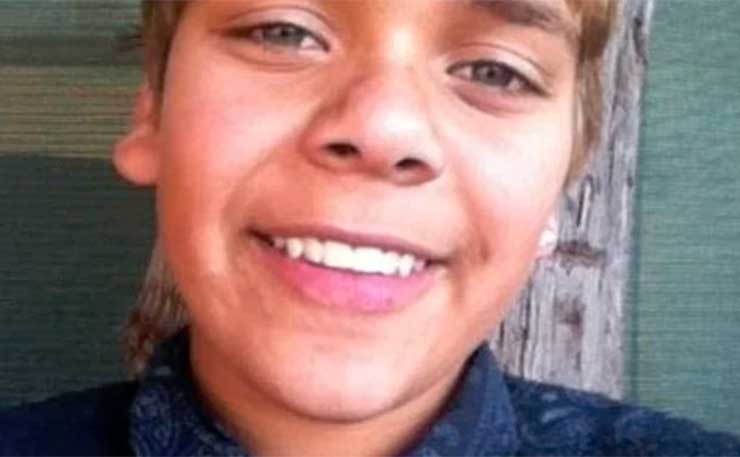
Elijah’s grandfather Albert Doughty said, “Kids have been chased in cars for too long, and reported, [but]nothing done about it.”
Just two weeks later, four-wheel-drives were reported to have driven through a memorial camp set up for Elijah on the location where he was killed, almost hitting people in the camp.
As well as anger, speakers at meetings and vigils expressed their grief. Elijah Doughty’s cousin, Preston Colbong, said, “And it’s about remembering a young man that we’ve lost. It’s the same thing that we’re going through every couple of weeks, every couple of months… a young man who was lost in prison or a young woman who was run over.”
Professor Smallwood said, “We’re attending funerals almost on a weekly basis in this country.”
And resident Frank Marin told a journalist, “When a child as young as that passes away, it affects everybody and everybody’s hurt at the moment.”
According to the Australian Indigenous Psychologists Association, bereavement is the single biggest risk factor to the social and emotional wellbeing of Aboriginal and Torres Straight Islander people.
For a brief time after Elijah’s killing, the media took an interest in Aboriginal grief. Sort of.
Issues of Aboriginal life and death made some headlines for a week or so. There was also some thoughtful analysis and discussion and comment. But not enough.
Even with a ‘race riot’ and an arson, the very stuff of news headlines, 19 days after Elijah’s killing a Google search for related stories (‘Elijah Doughty Kalgoorlie’) yielded 364 news results.
A Google search for ‘The Bachelor Australia’ in the same period yielded 36,500 results.
Under ‘news’.
How bachelor Richie feels about Nikki or Alex is more newsworthy in Australia, it seems, than how Aboriginal people feel about justice for black victims.
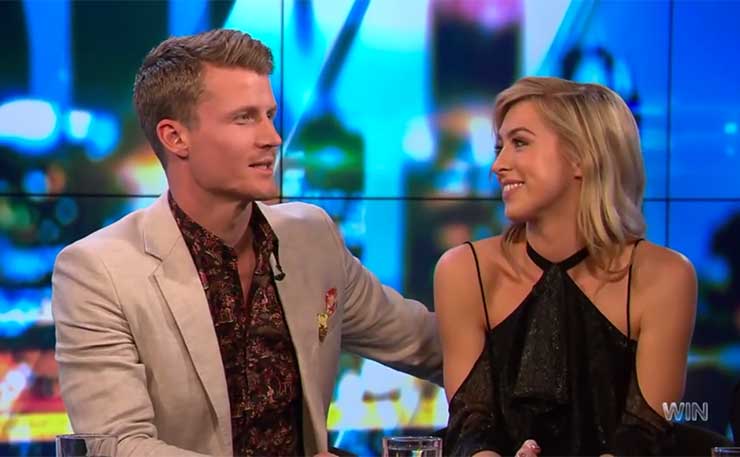
But what are the likely consequences? In the wider scheme of things, how important is punishment of white crimes against black victims for race relations in Australia? What is the likely impact of our collective indifference to the subject?
As chance would have it, not long before Elijah Doughty’s death researchers at the University of Queensland asked these very questions.
In a 2016 paper titled The Impact of Unpunished Hate Crimes, a psychological research team examined whether sentencing of white offenders might influence racial attitudes in Australia. The study compared readers’ responses to two fictitious versions of a racially motivated killing, based on a real crime against an Aboriginal teenager in Queensland.
Participants in the study “read a fictionalised account of this event that was presented in an ostensible newspaper article [The Australian]. An intoxicated White male teenager is described as having argued with and hurled racist remarks at an Indigenous male teenager who has gatecrashed a party. The white teenager drives off and is pursued into the road by the Indigenous teenager. The white driver subsequently reverses and knocks over the Indigenous teenager. He then runs over the victim with his car again, seemingly aiming at him; the victim dies.”
Both versions of the article stressed that “the relevant authorities believed the crime to be intentional and racially motivated”. In one version the white male perpetrator was convicted of murder and sentenced to life in prison. In the other version, he received a conviction of dangerous driving causing death, with a light jail sentence, and the hate crime charge was dismissed.
Readers, not surprisingly, reacted differently to the two scenarios.
As expected, when the perpetrator got off lightly readers were angry. They expressed outrage, and wanted the killer punished in accordance with his crime.
Hang on.
No.
It was the other way around.
When the perpetrator got off lightly, readers “derogated the individual Aboriginal Australian victim”. They responded not by disparaging the lenient sentence, but by disparaging the Aboriginal victim’s character.
The researchers noted that this goes against a common sense notion of values which “intuitively predicts that people respond with sympathy when their sense of justice is threatened, and will subsequently attempt to restore justice through positive co-operation with the victim and punishment of the perpetrator”.
However, in reality “when confronted with an innocent victim suffering without the possibility of reward or compensation, people can become motivated to blame the victim for his or her own suffering and derogate their character, in order to restore their perceptions of the situation’s fairness. Such victim derogating responses to injustice have been demonstrated with disheartening regularity”.
Think rape and domestic violence, for instance.
While the University of Queensland study was not the first to demonstrate victim-blaming in the face of injustice, it was among the first to demonstrate derogation of an Aboriginal Australian victim of a white Australian murder.
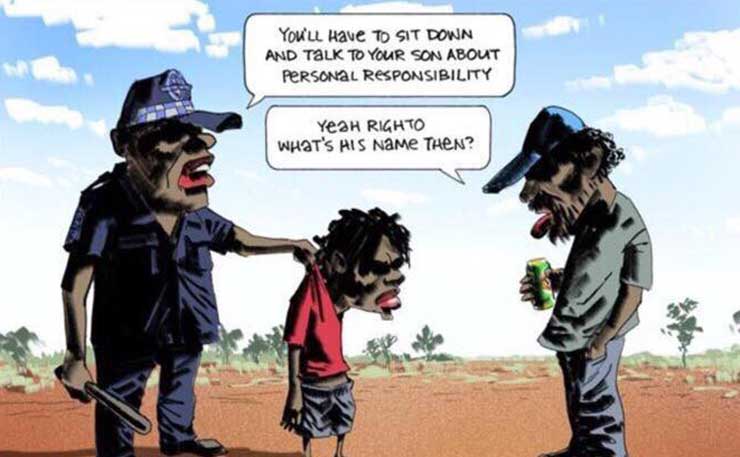
Right on cue, the Herald Sun published a post on September 3rd titled Kalgoorlie Riot Proves Leak Right, pointing the finger at Elijah’s parents.
The Queensland study was a first on another front as well. While most previous research has focussed on individual victim-blaming, the Queensland study examined whether unpunished hate crimes could influence not only attitudes towards a single victim, but towards an entire racial group. In other words, whether lenient sentences might fuel racism.
The researchers found that when the perpetrator in their scenario escaped a murder charge, “participants not only derogated the individual Aboriginal Australian victim more… they also expressed greater racism toward the victim’s group. These findings provide support for the alarming hypothesis that racist hate crimes are not only the manifestation of a racist society, but may also bolster racial prejudices if leniently treated”.
In summary: the more that white people kill black people and get away with it, the more racist against black people everybody becomes.
Little wonder the Herald Sun feels free to blame Aboriginal parents for a white man’s crime. And little wonder Aboriginal people want to see white perpetrators appropriately punished.
But what is wrong with us? Seriously?
How could the human mind become so malignantly twisted and warped as to blame our own victims for our own lack of accountability? And I’m not just talking about the Herald Sun. I mean white Australia.
The Queensland study took a look at this question as well.
The psychological culprit, according to the research, is belief in a just world. Just-world beliefs entail “the global internalised proposition… that the world is a fair place and that people will generally get what they deserve. This adaptive belief creates a secondary unconscious motive to defend against the acknowledgement of injustice”.
When people with a just-world mindset encounter real-world injustice, their justice-beliefs come under threat. Rather than calibrate their justice-beliefs in line with reality, they calibrate their perception of reality in order to preserve their justice-beliefs.
In Australia, acknowledging the reality of injustices against Aboriginal people would shatter many people’s faith in Australian society so profoundly that confronting reality is unbearable. Blaming Aboriginal victims, and Aboriginal people, offers an unconscious way out.
For the same reason, belief in a just world has been consistently linked with other victim-blaming mindsets such as rationalising privilege, downplaying injustice, prejudice of all kinds including racism, and conservative or right leaning ideologies – all of which are correlated, incidentally.
The Queensland findings were no exception. Belief in a just world was associated with greater racism against Aboriginal people when the white killer got off lightly, leaving justice beliefs intact.
So what is the remedy? How can a society – Australian society – short-circuit such a blinkered, deadly cycle of racist self-deception?
That, unfortunately, is a question the Queensland study didn’t tackle.
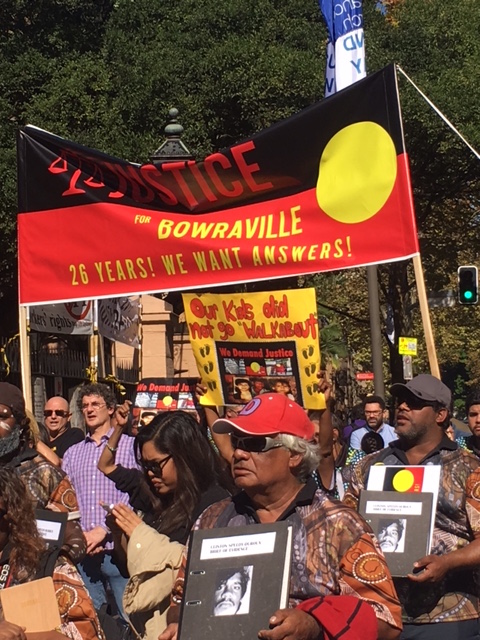
The authors did, however suggest that their results “highlight the important role of political and judicial authorities, whose response or non-response to a hate crime can exacerbate or ameliorate existing prejudices.”
In his wisdom, Western Australian political and judicial authority Attorney General Michael Mischin called the Kalgoorlie courthouse protestors, whose Peoples have endured generations of hate crimes, a “lynch-mob”. He denied any role of the justice system in their distress, saying that they had “taken advantage of… the death of this young teenager in order to exploit the situation”.
No prizes for guessing whether this response is likely to exacerbate or ameliorate prejudice. And racial tension.
The acting Kalgoorlie-Boulder mayor Allan Pendal expressed disappointment with the response of other institutional leaders as well.
He said, “One of our greatest disappointments for the city is the lack of contact we’ve had from our own State Government. We have not heard in the past two weeks, while we’ve been going through this ordeal, from the Premier, or even from a minister or even from an agency head.… We’ve found that pretty disappointing because we see a significant role for the State to play in this situation.”
Perhaps Federal Government leaders might have been in touch if they weren’t so busy debating their “right to be bigots” under section 18C of the Racial Discrimination Act.
So much for institutional leadership.
There must be another way.
In addition to judicial and political authorities, the authors of the Queensland study noted that “how society responds to a hate crime can exacerbate or ameliorate prejudice, such that ignoring or dismissing discrimination can strengthen existing biases”.
Shame that there was so much Bachelor Australia news to report. Otherwise we might be more interested in racial justice.
But even if our political, judicial and media institutions are disinclined to take white crimes against Aboriginal Australians seriously, and even if just-world beliefs render many people dissociated and morally disengaged, not everyone is a slave to their just-world mindsets. Many people can, and do, recognise injustice and care about the lives, deaths and rights of Aboriginal Australians.
Yet Australia, by and large, remains gripped by a collective silence on the subject. Even when fires and ‘riots’ break out, black lives still don’t matter enough to most Australians to prevent us turning our collective heads.
Why don’t more morally engaged public figures make more public noise about this? Where’s the outrage over our collective moral failings?
Why aren’t we all protesting?
What is everyone afraid of?
Derision, according to psychologists. Scorn. Ostracism. Disparagement. ‘Derogation’ is the favoured psychological term.
Research on the subject has found that people who call attention to racism and discrimination tend to be viewed negatively: devalued, criticised, and disliked.
In a PhD thesis examining the issue more closely, Nadia Bashir from the University of Toronto investigated how and why public whistleblowers and dissenters, or ‘moral advocates’, are demonised by the very social groups they seek to enlighten and assist.
She says: “Individuals generally agree that questionable, harmful, and illegal behaviours are wrong and unethical. Thus, it may seem counterintuitive that individuals often vilify those who aim to expose and therefore eliminate these behaviours. A growing body of research demonstrates, however, that individuals who take a stand against immoral behaviours (i.e., moral advocates) can elicit scorn rather than admiration.”
This despite the fact that, according to research, “moral advocates who challenge wrongdoing publicly often act with good intentions, display behaviours that can be considered heroic, and strive to help the group improve”.
In Bashir’s research, such well-intentioned individuals were perceived as more annoying, offensive, arrogant, selfish, self-centred, obnoxious, greedy, insulting and traitorous than other people.
Quite a disincentive.
However, Bashir’s research suggests that a moral advocate’s sacrifice is worth the pain. She found that people who derogated moral advocates did so because they were fundamentally concerned with morality.
Wait, no – justice. No – fairness.
Actually, they were concerned with appearances.
People who derogated moral advocates did so because they feared that their group’s social image would be tarnished if group wrongdoings were publically exposed.
Bashir says that group members demonise moral advocates “not because they are concerned about being morally reproached by the advocates but rather because they are concerned about how the advocates have made their group look in the eyes of others”. To defend the group’s social image, “group members seem to adopt a ‘shoot the messenger’ approach.”
Lucky messenger.
Mercifully, however, in addition to slinging mud at moral advocates, advocate-haters are also motivated to restore their group’s reputation by lifting their moral game.
Bashir explains that “the same psychological process that elicits derogation of public moral advocates (i.e., social image threat) is also instrumental in… promot[ing]group change.”
The implication, she says, is that “if public moral advocates wish to boost concern about group change, they may need to shoulder the burden of backlash”.
She warns moral advocates against watering down their message in order to escape public scorn. This, she says “may, ironically, also undermine their influence on the group”.
Professor Smallwood echoes these conclusions when she says, “Until this country is humiliated constantly around the world to say, ‘stop talking about human rights around the world and clean up your own yard’, we will continue to have this cycle of abuse”.
But what if not enough people in positions of public influence are game to publically humiliate Australia and cop the backlash? What then?
As racism continues to feed on itself in its vicious, victim-blaming cycle, killing more black people and letting more white people off the hook, with not enough moral advocates to break the collective silence, where might it all lead?
Kalgoorlie today.
And tomorrow?
Speaking at a protest in Perth, Noongar Elder Mingli Wanjurri McGlade said of Elijah’s death, “We hope that this is a new beginning. Unfortunately a young boy has lost his life, it’s just so sad, but from here we hope people will realise we can’t do this any more.”
Donate To New Matilda
New Matilda is a small, independent media outlet. We survive through reader contributions, and never losing a lawsuit. If you got something from this article, giving something back helps us to continue speaking truth to power. Every little bit counts.

